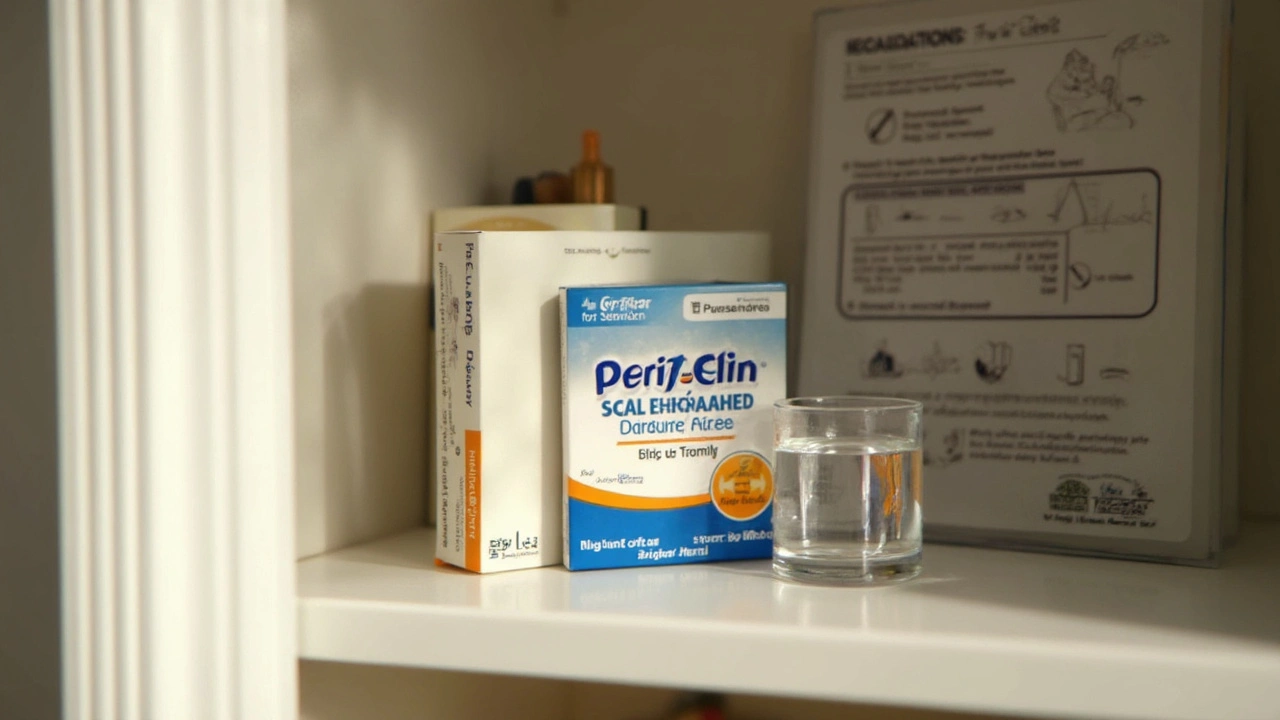Ever heard of a tiny tablet that has the power to shut down a sneezing fit, help someone pick up a few pounds, and even make your cat stop itching? That’s Periactin, or as the prescription label shows it, cyproheptadine. Most people either know it as something their grandma used for allergies, or have seen it pop up on the internet as a ‘miracle weight gainer’—but there’s a lot more to this yellow pill than you’d guess at first glance. People have tried all sorts of things to control allergies or get stubborn appetites moving, but Periactin has managed to hang around since the 1960s—so it must be doing something right, right? Let’s crack this open and see what’s really going on when the doctor hands you a bottle of these little guys.
What is Periactin and How Does it Work?
Periactin—scientifically cyproheptadine hydrochloride—is an old-school antihistamine. It was first sold in the U.S. in 1961 and sticks around today thanks to its unique way of working. Most allergy meds these days are the non-drowsy type (think Claritin or Zyrtec), but Periactin is part of the older family known for making people sleepy. That’s because it doesn’t just block histamine—the stuff your body uses to fuel allergies—but also tamps down serotonin, another chemical messenger. This double-whammy approach is why it doesn’t just treat itch but can also poke at other systems in your body.
In plain English, histamine is what causes itching, sneezing, watery eyes, and all that fun stuff during allergy season. When you take Periactin, it blocks some of the receptors that histamine needs. Fewer signals, fewer symptoms. But here’s what makes it extra interesting: by blocking some serotonin, Periactin can make you hungrier. That’s actually a side effect for most allergy drugs, but in this case, it’s useful for people who struggle to eat enough, like cancer patients, people with chronic illnesses that zap their appetite, or even picky eaters. Some older research also suggests cyproheptadine helps with migraine prevention and certain movement disorders, though it’s not a first-line therapy there.
| Periactin Facts | Details |
|---|---|
| Generic Name | Cyproheptadine |
| FDA Approval | 1961 |
| Main Uses | Allergies, Appetite Stimulant, Migraine Prevention |
| Common Side Effects | Drowsiness, Dry Mouth, Increased Appetite |
| Prescription Needed | Yes |
Another quirk? Periactin crosses the blood-brain barrier easily. This is why it can make you sleepy and affect appetite. For kids or older folks, that’s a double-edged sword because sleepiness can be a problem, while the appetite boost might be a blessing—or a curse if you didn’t want to gain weight to begin with.
Appetite Stimulant Uses: More Than a Side Effect
If someone told you their doctor put them on Periactin to help them gain weight, they’re not alone. In fact, it’s likely the most off-label use this drug sees. People with trouble keeping their weight up—maybe due to chronic illness, after surgery, or during cancer treatment—often get prescribed Periactin for a few weeks or months to see if it helps. There’s also chatter online from folks in bodybuilding or those who struggle with ‘picky eating’ in kids. Some pediatricians even use it for teenagers who hit puberty with no appetite to match their growth spurts.
What’s fascinating is Periactin isn’t actually FDA-approved strictly for appetite. Its official use is still ‘allergic conditions’, but a 2014 meta-analysis published in the journal "Appetite" showed cyproheptadine had consistent appetite-boosting effects, especially in underweight children with chronic disease. The authors pointed out, though, that you have to watch out for rapid weight gain or other side effects down the line:
"Short-term trials confirm increased weight gain in children, but long-term safety and efficacy need more research." (Appetite, 2014)
It works by blocking serotonin, which among other things, helps regulate feeling full in the brain. Block it, and suddenly food looks a lot more tempting—and you’re likely to eat more than usual. This is different from your typical weight gainer supplement which just loads you up on calories. Instead, Periactin actually changes your natural hunger signals.
If you or someone you know has a health condition that makes food unappetizing, ask their doctor about this med. But please, don’t go popping it just to bulk up without medical advice—there are risks, especially if you already put on weight easily or have certain health problems.
- If you start Periactin for appetite issues, monitor weight weekly, and keep an eye on mood—serotonin blockers can sometimes affect emotion.
- Use food diaries to track intake, so you don’t overshoot and end up gaining more than you bargained for.
- Pair it with gentle activity to keep weight gain to muscle, not just fat.
- Ask your doctor how long to use it. Most people only need it temporarily.

Managing Allergies and More: When Periactin is the Right Pick
Allergies are notorious for making life hell when the pollen count spikes or the neighbor’s cat waltzes in (Jasper, my own cat, is thankfully hypoallergenic—or I’d be sniffling all day). Claritin or Allegra gets thrown around a lot, but Periactin can be a helpful tool when those don’t work or cause weird side effects. Because it’s an older antihistamine, it tends to be strong—great for stopping a nasty rash, terrible for driving or focusing in school.
Doctors still use Periactin for allergic reactions with really bad itching, hives, or when kids wake up at night scratching. Its effect on sleepiness can be a plus here: take it before bed, scratch less, and maybe sleep through the night. The drowsiness can feel overwhelming for some, though, so start at night.
In rare cases, doctors prescribe it for migraines, especially in kids and teens. It’s thought to work by altering the histamine-serotonin system, which can trigger or amplify headaches. It isn’t anyone’s first choice, but when other meds fail—or interact with something else a person is taking—cyproheptadine is sometimes dusted off and given a shot.
There’s even a use for pets! Vets sometimes prescribe Periactin for cats (like Jasper, who once had an allergy attack from a mysterious spring pollen cloud) when they have nasty itching that doesn’t stop with topical treatments.
- If you need Periactin for allergies, tell your doctor about other sedating meds or alcohol use—it multiplies drowsiness.
- Don’t drive or operate machinery until you know how it affects you.
- Kiddos and older adults need lower doses, since they’re more sensitive to the side effects.
- If mood swings or confusion hit, get your dose reassessed quickly.
For people who want a one-stop solution that helps both with hives and appetite, there’s not a lot that matches Periactin’s mixed bag of effects. But always weigh the sleepiness and cognitive side effects before making it a regular part of your routine.
Side Effects, Safety, and Warnings
Here’s where things get real. Like every effective drug, Periactin has its dark side. The most common issue is drowsiness—and for some, that’s not just a cozy nap after dinner, but a “can’t keep my eyes open during the meeting” kind of sleepiness. If you’re a college student cramming for finals, this is not the answer to your allergy prayers.
| Side Effect | Chance |
|---|---|
| Drowsiness | 70% |
| Increased Appetite/Weight Gain | 30%-50% |
| Dry Mouth | 30% |
| Mood Changes | 10%-15% |
| Confusion (Older Adults) | Up to 15% |
Other side effects include dry mouth, mild constipation, and rarely, blurred vision or trouble urinating. In older people or kids, there’s a risk that confusion, aggressive behavior, or paradoxical excitement (being wired instead of sleepy) could show up. Mixing it with alcohol, sleeping pills, or antipsychotic meds increases the risk of accidental overdose or falls—especially in elderly people. There are some cases of dangerously high blood pressure in people who mix Periactin with certain antidepressants (MAO inhibitors), so let your doctor know if you take anything for mood.
Because Periactin blocks serotonin, people with a history of depression or mood disorders should use it cautiously. Anyone with glaucoma, enlarged prostate, or trouble urinating should steer clear unless their doctor says it’s okay. For pregnant or breastfeeding people, it’s usually avoided unless the benefits outweigh the risks—Periactin hasn’t been studied enough to say it’s truly safe for a developing baby.
- If you start getting severe headaches, vision changes, or notice your heartbeat racing, stop and call your doctor.
- Don’t suddenly mix it with alcohol or start new meds without checking with a pharmacist.
- Store Periactin out of reach of kids and pets—accidental overdose can be really serious.
- For pet owners: don’t medicate your pet without a vet’s prescription—cats and dogs process drugs differently than people.
One last thing: with the rise in popularity of appetite stimulants online, there are lots of sketchy sources selling Periactin without prescriptions. Don’t trust these; there have been reports of fake or contaminated pills. Always stick to a legit pharmacy.

Tips for Safer Periactin Use and When to Call Your Doctor
If you’re staring down your first prescription bottle of Periactin, take a deep breath—it isn’t as scary as it sounds once you know what to expect. Start with the lowest dose your doctor suggests, and see how your body reacts after the first few days. Most adults begin with 4mg two or three times a day, but your doc might tweak it if you get hit hard with drowsiness or other side effects.
- Take it with food if you get a sore stomach or nausea. Some people find a glass of water and a quick snack help.
- If you miss a dose, don’t double up, especially before driving or heading to school. Just wait and take the next dose as scheduled.
- Track your symptoms in a notebook or app. Any mood changes or crazy tiredness? Let your doc know ASAP.
- Keep hydrated—dry mouth and constipation are easier to manage if you push a little extra water each day.
Watch for anything that feels unusual: intense mood swings, trouble seeing, peeing less often, or strange heart rhythms. These aren’t everyday side effects, so they need a doctor’s input.
Also, medication routines shift as bodies change. Teenagers can react differently than adults, and adults in their 60s and up are often more sensitive to side effects—especially confusion or memory changes.
Because Periactin affects the central nervous system and interacts with a bunch of other medicines, always keep a current list of everything you take. Pharmacists can screen for weird interactions better than most internet tools. And remember: allergic reactions don’t always look like a rash—rapid swelling, wheezing, or throat closing? Head for emergency care.
Finally, don’t be afraid to ask questions about tapering down if the side effects are more trouble than the allergy or appetite problem you started with. Phones exist for a reason—use them! Most people only need Periactin for a temporary stretch. Your doctor probably expects to check in on how you’re doing, so keep the lines open.








reshmi mahi June 29, 2025
So Periactin is like the grandpa of antihistamines 😴🍌... my aunt used it for her cat and now Jasper looks like a fluffy sausage. Also, why is everyone on Reddit using this to bulk up?? 🤔
laura lauraa July 1, 2025
The philosophical implications of pharmacologically manipulating serotonin to induce hunger... are we not, in essence, commodifying desire? The human condition, reduced to a receptor blockade. And yet... we call it 'medicine.'
Allison Turner July 1, 2025
This is just a sleep pill with a side of snack mode. No one should be using this unless they’re literally dying. And even then... maybe not.
steve stofelano, jr. July 2, 2025
While the pharmacological profile of cyproheptadine is indeed historically significant, its contemporary off-label utilization warrants rigorous clinical oversight. The risk-benefit calculus must be individualized, particularly in pediatric and geriatric populations.
Savakrit Singh July 3, 2025
India has been using this for decades for kids who won't eat 😅... but now Americans are turning it into a gym supplement? 🤦♂️😂
Cecily Bogsprocket July 3, 2025
I’ve seen people on this med and it’s like watching someone slowly turn into a sleepy, snack-obsessed ghost. It’s not magic-it’s just chemistry. But if someone’s losing weight because they can’t stomach food, and this helps them feel like eating again... that’s not bad. That’s human.
Jebari Lewis July 4, 2025
I'm curious-how many of these off-label uses have been formally studied? I've read the 2014 meta-analysis, but what about longitudinal data? Are we just letting people experiment because it's cheap? This needs more transparency.
sharicka holloway July 5, 2025
My cousin’s kid was on this after chemo. He went from eating three bites a day to devouring whole pizzas. It wasn’t pretty-but he survived. Sometimes the side effects are just the price of breathing.
Asha Jijen July 7, 2025
So this is the pill that makes your cat stop scratching and your grandma gain weight?? Wow. I mean... cool? But also why is this even a thing??
Edward Batchelder July 8, 2025
I appreciate the depth of this post. It’s rare to see a medication explained with such care. Periactin isn’t glamorous, but it’s been a quiet lifeline for so many. Let’s not dismiss it because it’s old.
Kaleigh Scroger July 9, 2025
I’m a nurse and I’ve seen this used in hospice for patients who lost their appetite. It’s not a weight gainer-it’s a dignity preserver. People forget that sometimes the most powerful drugs aren’t the flashy ones. This one just quietly brings back the will to eat.
Elizabeth Choi July 10, 2025
This article is overly optimistic. Drowsiness is 70%? That’s not a side effect-that’s a disability. And you’re casually recommending it for kids? Please.
Darrel Smith July 11, 2025
I’ve been on this for three months. My doctor said it was fine. Now I’m 40 pounds heavier, can’t focus at work, and I keep falling asleep in the middle of conversations. I didn’t sign up for this. I just wanted to stop sneezing.
Aishwarya Sivaraj July 12, 2025
I gave this to my son after his surgery and he ate like a bear waking up from hibernation 🐻❄️... but then he started talking in circles at night. We stopped it. It’s powerful stuff. Don’t treat it like a vitamin.
Iives Perl July 13, 2025
They’re hiding something. Why does this work on cats AND humans? Why does it make you sleepy AND hungry? Who really controls serotonin? 👁️👁️
Emma louise July 14, 2025
Of course Americans are turning this into a bodybuilding hack. We turn everything into a trend. Next thing you know, people will be using cough syrup to get abs.
Alex Hess July 16, 2025
This is just another example of Big Pharma repackaging a 60-year-old drug as a ‘solution.’ The real issue? Our culture glorifies weight gain and ignores underlying mental health causes. This isn’t medicine-it’s a bandaid on a broken system.